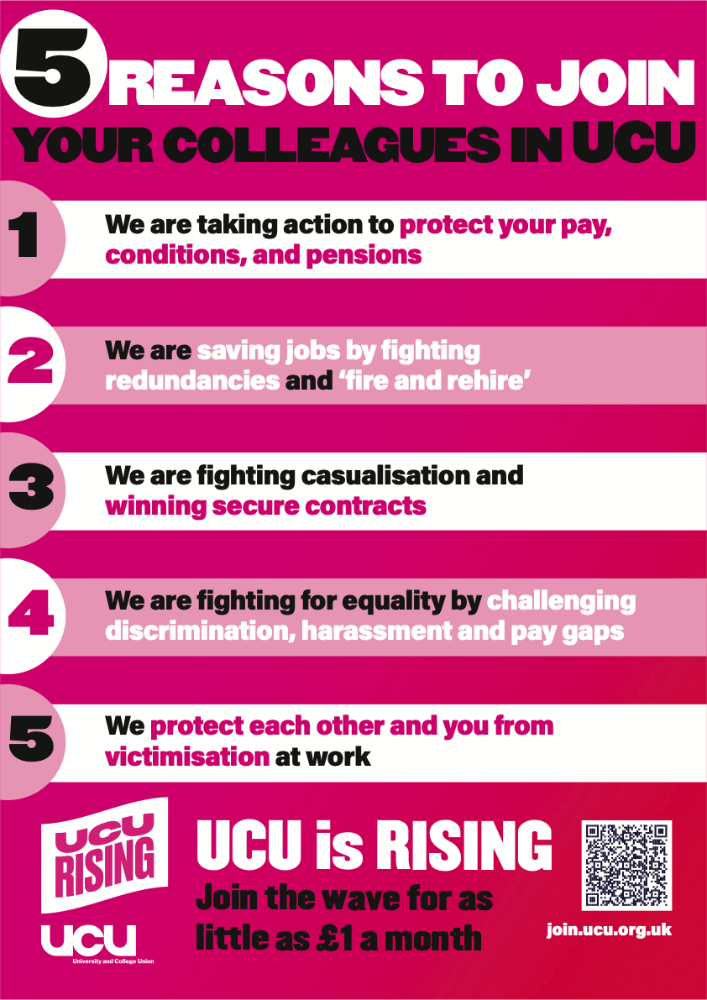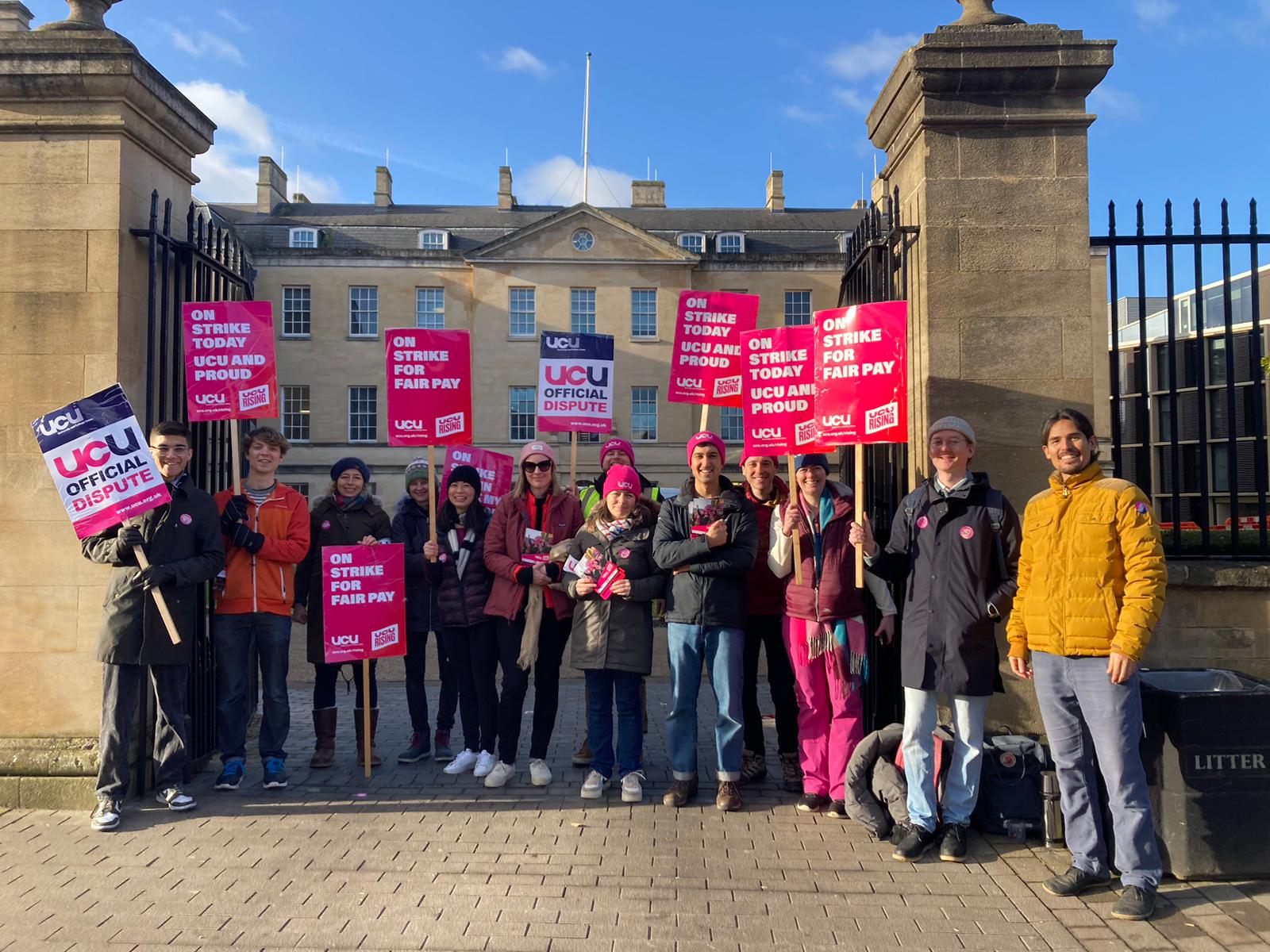
Today I am on strike. My first time striking was in November when the University and College Union (UCU) national ballot came back in favour of both strike action and action short of a strike (side note: I find it telling that the ASOS involves only working to contract, meaning only doing the work that one is paid for and not taking on extra work or working overtime for free. In what world does ‘only’ doing your job count as industrial action?!). The national ballot means that basically all of higher education in the UK is on strike right now, along with almost every other worker it seems: teachers, nurses, paramedics, rail workers, fire fighters, postal workers… but walking around University of Oxford you would hardly know it. Most staff don’t join the union and definitely don’t join the picket line. And I can understand why. My experience striking has involved lots of unpleasantness. Not working when I am under so much pressure to work is really stressful (should I really cancel that meeting??). I’m anxious not knowing who supports the strike and who wants to tell me to ‘get back to work’. I feel depressed and abandoned without the support of others in my department. It feels like I’m only hurting myself by striking, especially when my work is primarily research. The first strike day I received work-related messages from students which felt absolutely terrible to ignore. I’ll lose quite a lot of pay as these strike days add up. I miss out on meetings/events that I want to attend. I get anxious about not striking ‘properly’ if I arrive at the picket late or if I’m too cold and tired to attend afternoon events or if I sneak in a bit of work. I’m nervous about my colleagues asking me for updates about the negotiations if I haven’t found time to read all the latest updates. What’s the point? I feel powerless. My contract is up in a few months anyway. Why bother? No one else seems to care. The impact of me striking is so much less than a nurse or rail worker striking. Plus, aren’t we lucky to have this job?
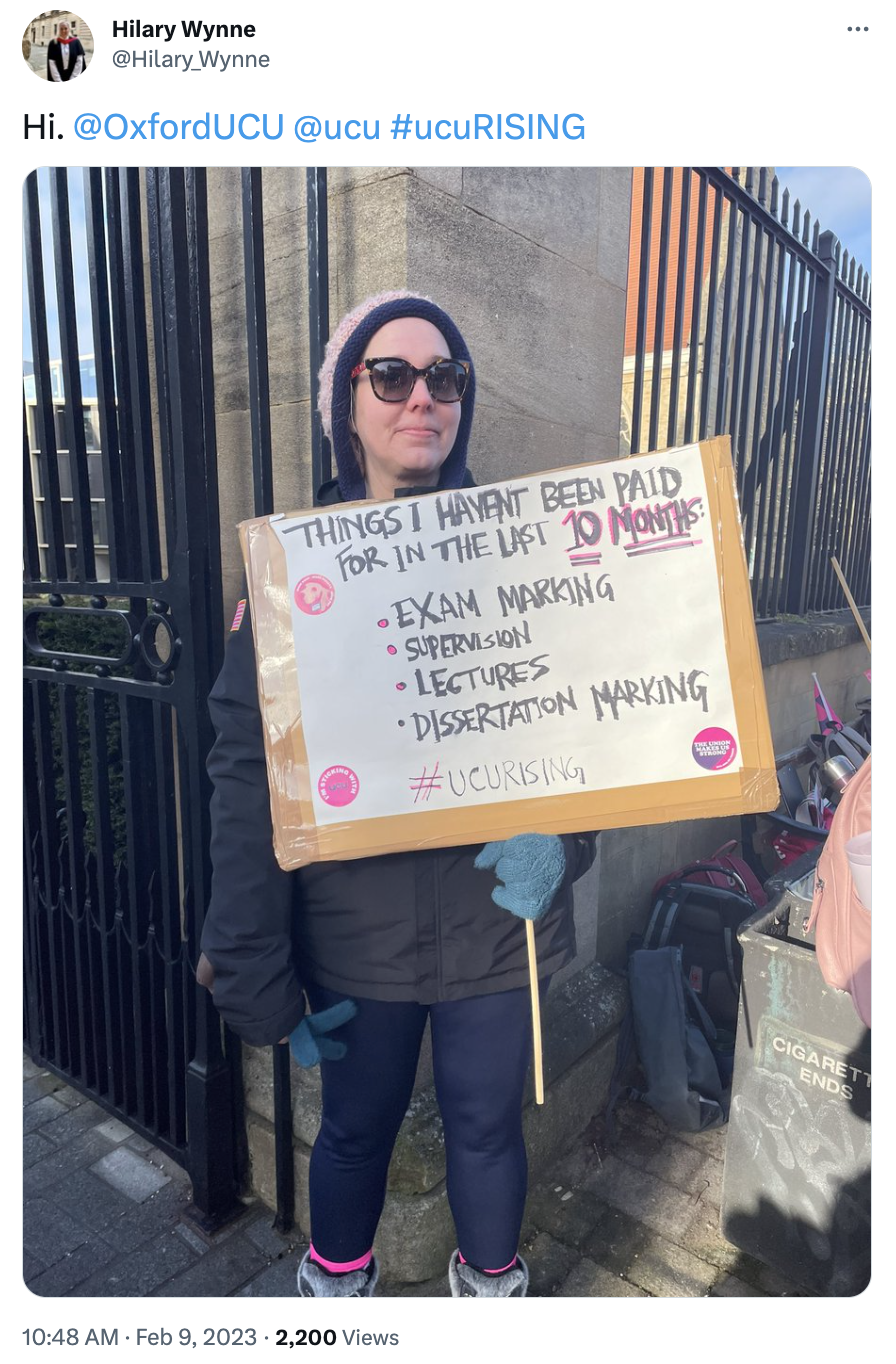
So why do I strike? Simply, because my union voted to strike. Independent of my own working conditions and whether I personally voted for strike action, I strike in solidarity with my colleagues who collectively said ‘enough is enough’. I’m not saying I don’t have complaints. These disputes concern issues that definitely affect me. But my decision to join the union and strike when they vote to strike is more basic than that. My idea of a better future involves a strong labour movement who fight for workers’ rights as part of broad, multifaceted efforts to reverse growing inequality. The proportion of unionized workers has been declining in places like the US, Canada, and the UK over the past several decades as service industries have replaced more traditionally unionized professions like manufacturing. Around the world, people are struggling to unionize and face union-busting and severe retaliation for taking action. I have a union and the protected right to strike. In the global struggle for workers’ rights, surely the least I can do is join my own union?!
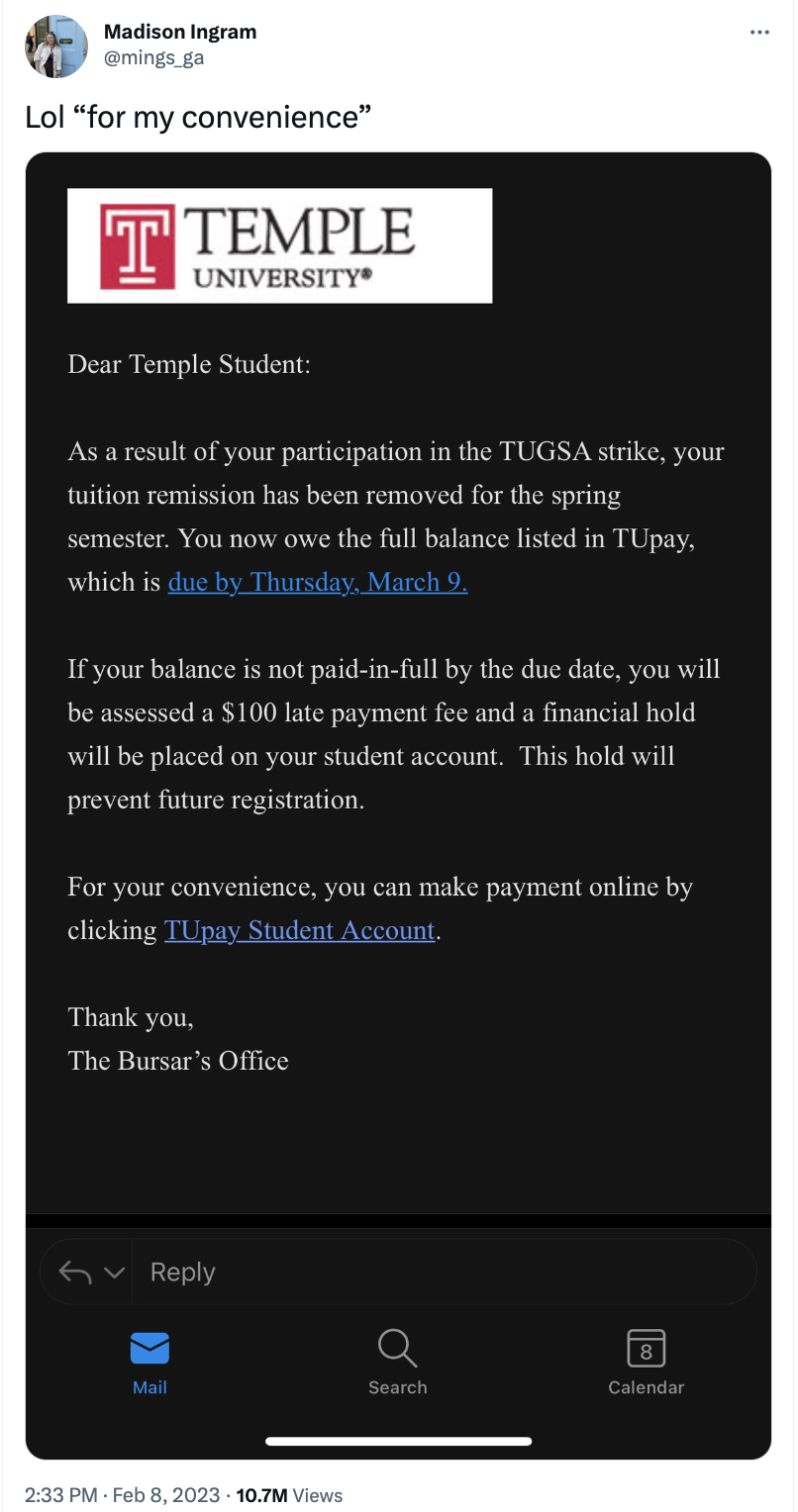
UCU’s demands in these disputes are completely reasonable. The asks are mostly for the employers to give back what they’ve already taken. We want our old pension scheme back after they cut it by 25-30% for demonstrably no good reason. We want pay to rise with inflation. We want a plan to address the gender gap, race gap and disability gap. We want to stop replacing long term contracts with precarious short term contracts. And we want reasonable workloads that can be managed within the number of hours we’re paid for in a week. The universities can afford it. Last year, they ended the year with £2.4 bn more cash in the bank than they started with. Instead of investing in their staff, they are constructing new buildings and other vanity projects. They are doing this because they can. They can because we let them.

The increasing commodification of education and research is not surprising, of course. Neoliberalism has normalized the harsh reality of a world driven by profit and personal responsibility. But just because it’s normal doesn’t mean it’s right. Students are not customers. Education is not a commodity. The value of research is not determined by how easily it can be monetized. Attending my first UCU events made me realize that there are other people around me who are willing to resist, not just in a particular pension dispute that may not affect me much if I end up leaving the UK within the year, but in the larger fight to dethrone the destructive logics of neoliberalism.
So despite all the unpleasantness, striking and attending associated rallies and teach outs has been inspiring and motivating and full of solidarity. Yesterday on the picket we spoke with some fire fighters who asked how our negotiations are going and wished us luck. Last week we held a joint march with the teacher’s union. These events take me out of my ivory tower and help me to stay focused on the issues of working people in my community. Lots of students also participate and express their solidarity. They know that this affects them too. During the second week of strikes last autumn, I attended a teach out on radical pedagogy with staff and students. We read an excerpt from Pedagogy of the Oppressed by Paulo Freire. It was so inspiring to discuss how learning and mentorship relationships can be more equitable, non-hierarchical, respectful, inclusive, and therefore effective. I feel empowered and energized to build those kind of relationships in my daily work. Yesterday I attended a teach out on radical needlework: knitting and crochet. We plan to meet again next week to make some strike related paraphernalia in UCU colours. I vacillate between feeling amazed and inspired in these pockets of magic and utterly depressed when I remember how thin participation is.
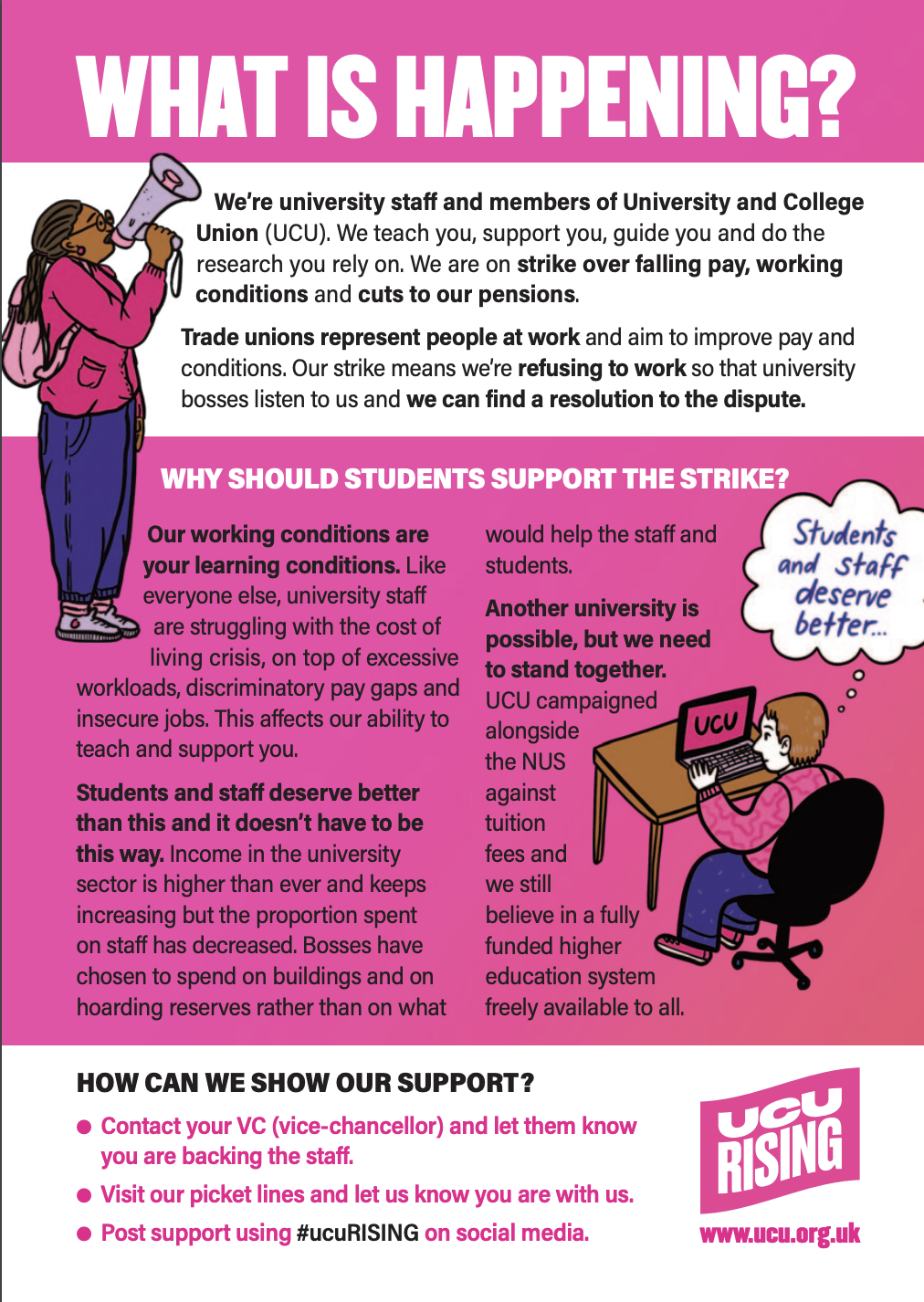
I understand that not everyone has the capacity to strike and I respect that. Honestly, I don’t think I’ll have the capacity to keep it up. Some work feels too important, too tragic to abandon. We all have to navigate these decisions for ourselves. I try to prioritize being visible on the pickets and vocal about the strikes since other forms of withholding my labour feel less effective (and more personally harmful). But we wouldn’t have to keep it up so long if more people showed their support, however they can.
I think as a postdoc or anyone on a short-term contract, participating in the union can be especially unattractive. You haven’t necessarily been here long enough to understand the issues, you might not stay here long enough for any of the fallout of the industrial action to actually make a difference to you. And we’re so stressed about our work and figuring out what we’re going to do next, that we don’t have time or energy to think about much else. This is very convenient for the universities, who are increasingly hiring people on shorter and more precarious contracts. The way I see it, the struggles at my current institution are continuous with the struggles at my next institution. The specific issues might be different but the fight is the same. And it’s not a fight for me, it’s a fight for us. Even if I am not here long enough to benefit personally much from the reinstatement of our pensions, the next postdoc who comes in after me will, and the one after that. And I will benefit from the actions of those who are currently organizing at whereever I end up going next. I am trying to unlearn the individualism that limits my capacity for empathy and solidarity. It is so easy to feel isolated in academia. How can we recentre and rejoin the collective?
Hopefully at the next negotiation meeting we’ll receive a better offer and there will be no more strike days. When that happens, everyone will benefit, and it will be due in large part to the hard work of the overburdened volunteers who organized—thank you! I hope that more of my colleagues join the UCU so that we can better take care of one another. The longer the pickets the shorter the strikes. Let’s not take our rights for granted.
Onward in solidarity.
